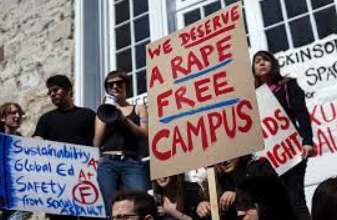The 2020 Annual Security Report for Eastern University boasts crime statistics for the past three years such as zero cases of rape, zero cases of dating violence, and only one non-penetrative sexual offense in the past three years.
Having spent three years at Eastern University as a woman, in community with other women on campus, I can confidently say these numbers are vastly underreported. In my time at Eastern, I have supported friends who were harassed, intimidated, and inappropriately touched by male students they now sit next to in class every day. I know students afraid to walk alone at night on campus, a student who had a knife pulled on them on the Sparrowk path, and several students victimized by sexual assault.
These stories remain unreported. But why?
There are a number of reasons why a student may choose not to report harassment and assault, such as fear and shame, but there are other factors that impact
underreporting as well.
Women are unwilling to report when they know from other women that the perpetrator was not held accountable for their actions. Why go through the pain of recounting, reliving, and retraumatizing when you know your pleas will be ignored?
Women are unable to report when they can be penalized for their reporting. Eastern University does not have an established amnesty policy for victimized students to encourage reporting and seeking help.
Women are unable to report when their experiences are confined to on-campus violence. Violence between two students, on or off campus, is violence against the
student body and should be treated as such.
Under-reporting is not a blameless phenomenon. Eastern’s nonexistent assault reports are not indicative of a lack of violence, they’re proof of a failure to address and support violence against the student body.
Among undergraduate students aged 18-24, 26.4% of women and 6.8% of men experience rape or sexual assault on campus. As a Christian institution we are not exempt from these statistics. Instead, Christian institutions are more susceptible to the silencing forces of purity culture and shame and must work twice as hard to protect students.
Eastern students do not need awareness of sexual violence. We are painfully aware. We need amnesty policies to facilitate reporting. We need support groups for the students affected by violence. We need all violence between two students to be penalized, not just incidents on campus. We need violent offenders to see consequences.
Further, if a football team is to be added to an already athletically saturated school, we need resources. We will need more CCAS staff, space, and funding. We will need more RA funding, better resources to offer students, and policies to support them.
Only then will reporting reflect the experiences of the student body. These policies are not just necessary to improve reporting, they are vital to students’ academic
success, mental health, and access to desperately needed resources. These policies save lives, and reflect a mission which Eastern boasts but has yet to actualize.
We must operate under the knowledge that students are experiencing violence. Eastern University must ask itself, why aren’t students reporting, and what can we
do to change that?
For the National Sexual Assault Support Hotline, call: 800.656.HOPE (4673)
Sources: Eastern University, RAINN

